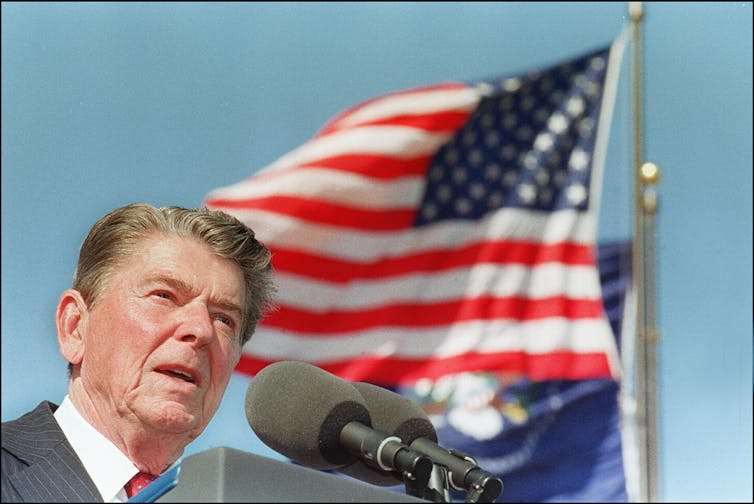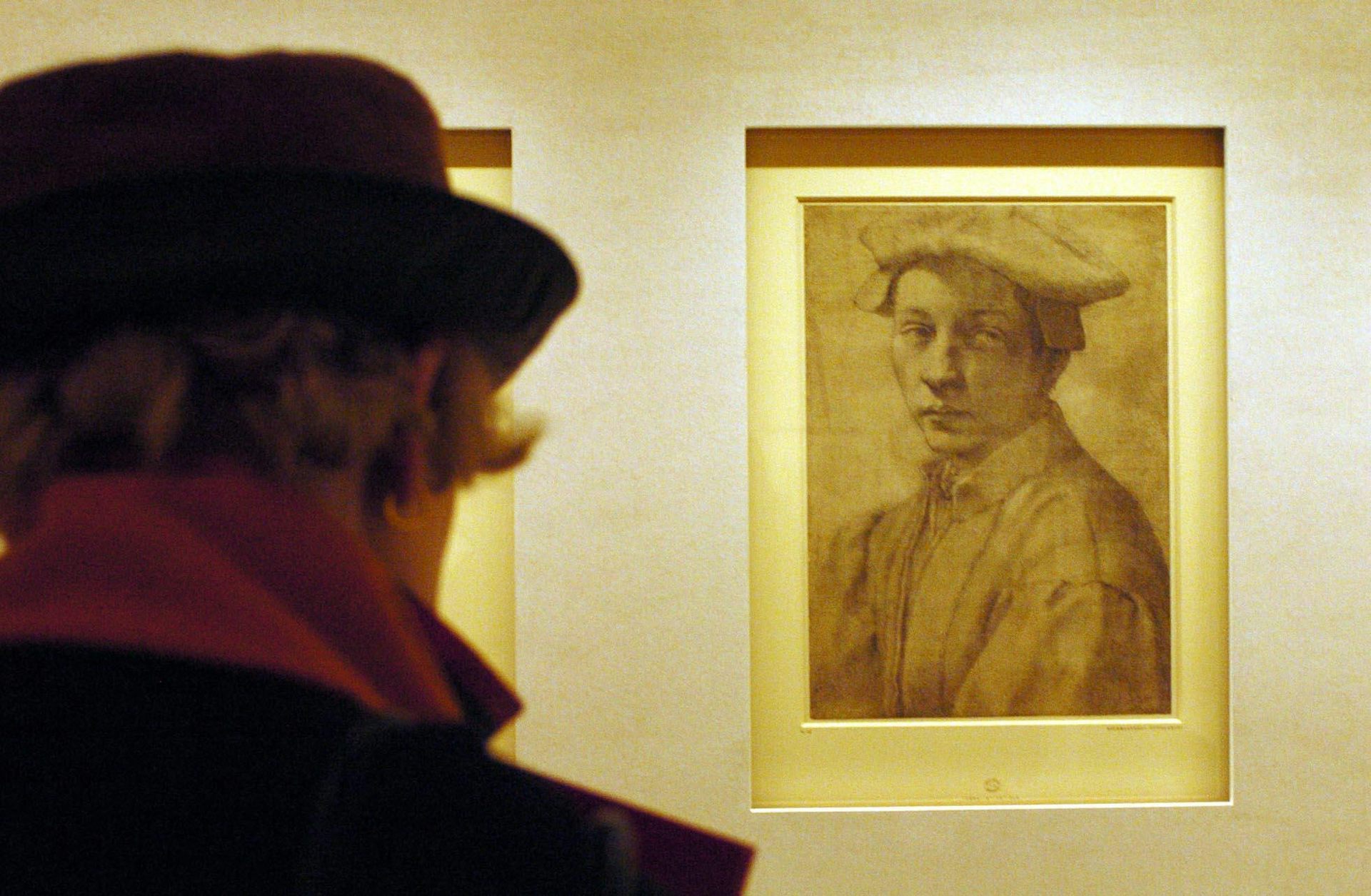Reagan’s great America shining on a hill twisted into Trump’s dark vision of Christian nationalism
Reagan and Trump − two of the most media-savvy Republican presidents − used religion to advance their political visions, but their messages and missions could not be more different.
In August 1982, Ronald Reagan’s father-in-law was dying. Nancy Reagan’s beloved dad, Loyal Davis, was an atheist – a troubling fact to the 40th president. So Reagan penned a private, handwritten note in which he recounted how the prayers of colleagues and friends had cured him of a painful stomach ulcer.
Giving hope for what lay beyond, Reagan entreated the older man, “We’ve been promised this is only a part of life and that a greater life, a greater glory awaits us … and all that is required is that you believe and tell God you put yourself in his hands.”
For decades, some of Reagan’s critics have questioned his religiosity, noting he rarely went to church. But the missive to his father-in-law reveals a deep and heartfelt faith. That faith also factored heavily into his political stands and policies, as I discuss in my book “Righting the American Dream: How the Media Mainstreamed Reagan’s Evangelical Vision.”
In recent years, Donald Trump, another former president and the current Republican presidential candidate, has often spoken about his faith, posing for photo ops with right-wing preachers and praising his “favorite book” – the Bible.
The latest such demonstration was a video in which Trump promoted sales of a pricey US$59.99 version of the Bible. “Let’s make America pray again,” he urged viewers. “As we lead into Good Friday and Easter, I encourage you to get a copy of the God Bless the USA Bible.”
While Reagan and Trump – two of the most media-savvy Republican presidents – used religion to advance their political visions, their messages and missions are starkly different.
Why religion plays a part in politics
In my book, I explain that underlying American politics is a religious vision that links citizens to civic values. The most prevalent vision is that God blessed America and tasked its citizens with spreading freedom and democracy. It’s an idea that has undergirded Americans’ patriotism and inspired American domestic and foreign policies for decades.
Reagan telegraphed belief in a God-blessed America by describing the United States as “a shining city on a hill.” Reagan flipped the original meaning of a Biblical phrase from a 17th century Puritan sermon. In Matthew 5:14, Jesus warns that the world will judge whether or not his disciples, a symbolic city on a hill, stick to their ideals. By adding “shining,” Reagan sanctified American exceptionalism and the United States’ role as a global model of freedom.

Once elected, Reagan sought practical ways to apply his faith in freedom, which, like many evangelicals, he believed came from God. By cutting taxes, ending industry regulations and privatizing government functions, he hoped to give individuals more economic and political freedom.
Reagan’s love of freedom also fueled his hostility to the Soviet Union. He labeled its communist government “an evil empire,” because it denied its citizens freedom. Casting a geopolitical stance as a cosmic battle between good and evil, Reagan made defeating communism a religious calling.
I argue that Reagan’s evangelical vision was mainstreamed through the media, which reported his interviews and public statements. This vision was not always apparent, but Americans liked his policies even if they missed their religious dimension. In other words, when Reagan proposed allowing the free market to determine the economy, limiting federal power and standing up for democracy worldwide, one didn’t need to be an evangelical to agree.
A new religious vision
Trump saw an opening for a new kind of religiously tinged politics when he ran for president in 2016. But unlike Reagan’s vision of spreading freedom and democracy here and abroad, Trump’s vision sticks closer to home.
I would argue that Trump’s religious vision is rooted in white Christian nationalism, the belief that the white Christians who founded America hoped to spread Protestant beliefs and ideals. According to white Christian nationalists, the founders also wanted to limit the influence of non-Christian immigrants and enslaved Africans.
Likewise, Trump’s rhetoric, mainstreamed by the media, portrays “real” Americans as white Christians. Many of these are men and women fearful that secularists and religious, racial and ethnic minorities want to replace, if not eliminate, them.
By most measures, Trump is not personally religious, although supporters contest that claim. But he has convinced conservative Americans, especially white evangelicals, that he is “God’s instrument on earth.”
When confronted with his financial misconduct, sexual crimes and outrageous lies, backers say that God works through flawed men. And evidence of that work – the U.S. Supreme Court overturning abortion rights, building the border wall and moving the U.S. embassy in Israel from Tel Aviv to Jerusalem – has won him their support.
Trump’s mainstreaming of white Christian nationalism is evident in his latest scheme. The God Bless the USA Bible sports an American flag on its cover. Included with scripture is the Constitution, Bill of Rights, Pledge of Allegiance and the handwritten lyrics to singer Lee Greenwood’s “God Bless the U.S.A.” A portion of the sales will benefit Trump’s organization.
Christianity and nationalism hand in hand
Trump rejects America’s role as the “shining city on a hill” and its mission to spread freedom and democracy. His goal is to restore what he calls the “founding fathers’ vision.” It’s a vision shared by Americans who think the U.S. was founded as a Christian nation, despite proof to the contrary.
Religion can be a force for good or ill. Reagan believed that his religious vision would promote individual freedom and spread democracy worldwide. Americans may agree or disagree on whether he was successful and at what cost.
But Trump’s religious vision – one that hawks Bibles, disparages democracy and mocks governance – isn’t one that Reagan would recognize.
Diane Winston does not work for, consult, own shares in or receive funding from any company or organization that would benefit from this article, and has disclosed no relevant affiliations beyond their academic appointment.
Read These Next
Crowdfunded generosity isn’t taxable – but IRS regulations haven’t kept up with the growth of mutual
Some Americans are discovering that monetary help they received from friends, neighbors or even strangers…
What is Bluetooth and how does it work?
Did you know that your wireless earbuds contain a tiny radio transmitter?
How transparent policies can protect Florida school libraries amid efforts to ban books
Well-designed school library policies make space for community feedback while preserving intellectual…






